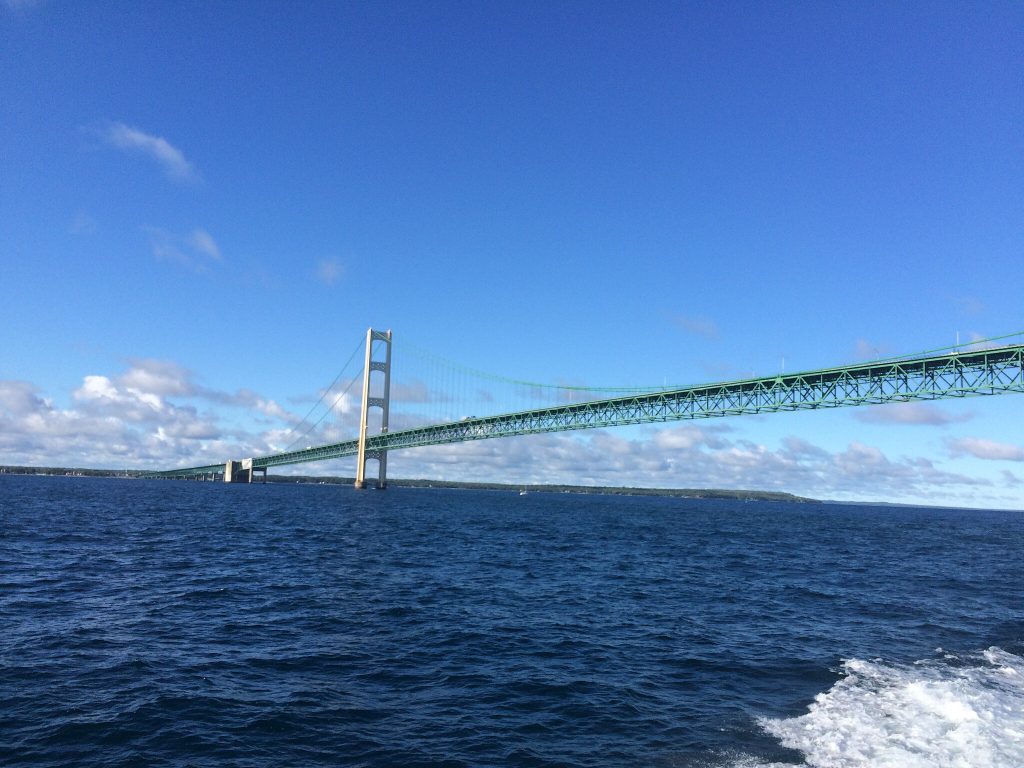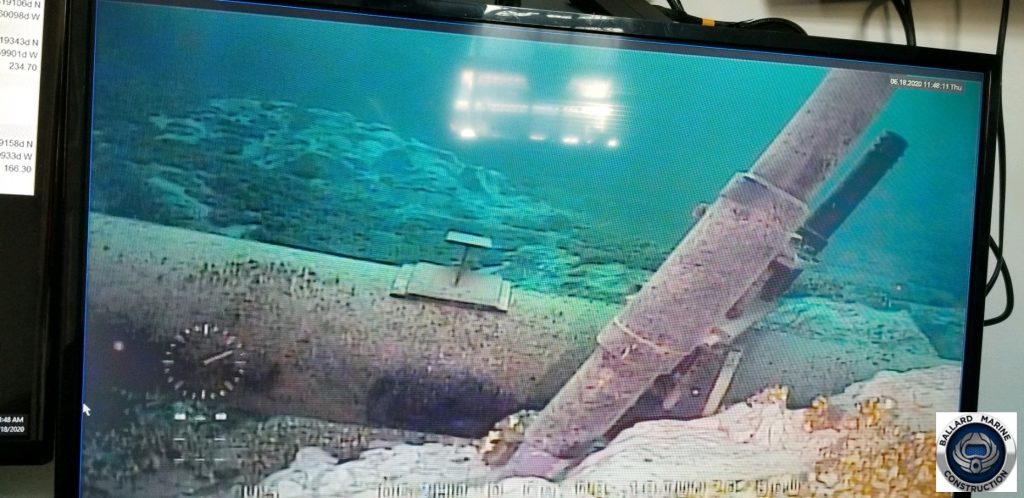Federal Agency Finds Great Lakes Tunnel Project Poses ‘Detrimental’ Effects to Water, Wetlands
But the Army Corps says Line 5 project effects would mostly be short-term.

A view of the Mackinac Bridge from the Straits of Mackinac. Photo by ElementBroccoli, (CC BY-SA 4.0), via Wikimedia Commons
Enbridge’s proposed $1 billion Line 5 tunnel project would harm water and wetlands, according to a draft environmental review released Friday by the U.S. Army Corps of Engineers. But the study found most environmental effects would be short-lived.
The agency said construction would include the release of about 20,000 gallons of drilling fluid and drawdown groundwater up to two feet in a small area surrounding the installation of a water intake pipe. The project would also pose long-term detrimental effects through permanent wetland loss and adverse effects to archaeological sites and traditional cultural resources that are significant to Anishinaabe tribes.
The Corps also removed consideration of climate impacts from its review due to President Donald Trump’s orders that boosted oil and gas production and rescinded actions on tackling the climate crisis.
Enbridge wants to build a 3.6-mile tunnel to house its oil and gas pipeline to reduce the risk of anchor strikes in the Straits of Mackinac that connects Lakes Michigan and Huron. Line 5 carries up to 23 million gallons of oil and natural gas liquids each day from Superior across northern Wisconsin and Michigan to Sarnia, Ontario.
The agency’s final review will inform its decision whether to issue a permit and whether the project complies with federal regulations, including the National Environmental Policy Act, or NEPA.
The Corps’ Detroit District Commander Lt. Col. Wallace Bendeff said the agency is committed to following the NEPA process despite the shortened review.
“The Detroit District continues to prepare the Final EIS and comply with all applicable legal and policy requirements, including its federal trust responsibility to Tribal Nations, the National Historic Preservation Act, the Endangered Species Act, and the National Environmental Policy Act,” Bandeff said.
The agency will issue a decision sometime this fall.
Enbridge spokesperson Juli Kellner said in a statement that the draft review is a significant step in the five-year review of the project. “Our goal is to have the smallest possible environmental footprint. The tunnel design already reflects that intent, and we will use the USACE’s findings from the (draft environmental review) to further refine the project,” Kellner said.
Enbridge has said the project will make a safe pipeline safer. The Corps found the tunnel project is necessary as demand for oil and petroleum products will remain steady or increase through 2050.

A photo depicting damage to an anchor support on the east leg of Line 5 within the Straits of Mackinac. Photo courtesy of Enbridge via State of Michigan
Army Corps analyzed multiple alternatives for the project
The agency examined several main alternatives for the project that include taking no action, building the tunnel as proposed or placing a protective rock cover over the exposed segment of Line 5 on the lake bed. The review also considered options for decommissioning the pipeline.
The public will be able to provide input on the agency’s findings through the end of June. Virtual hearings will be held June 18 and 25.
Environmental groups and Great Lakes tribes have condemned the agency’s move to fast-track review, saying the project poses too great a risk of an oil spill. Anne Woiwode with Michigan’s Sierra Club Chapter said in a statement it is reviewing the agency’s draft, but its position hasn’t changed.
“Line 5 remains an existential threat. Chances of an oil spill in the Great Lakes – our most valuable freshwater resource – skyrockets if this tunnel is built in the Straits. We can’t drink oil. We can’t fish or swim in oil,” Woiwode said.
The draft review said the risk of oil escaping the tunnel is “virtually zero.” The document states about 48 million gallons would need to spill over the span of around 50 hours to fill the tunnel and prompt a release.
David Holtz, who serves on Sierra Club’s board of directors, also raised concerns about the potential for methane to enter the construction area and risk an explosion. Enbridge plans to reduce that risk through ventilation and air monitoring. The Corps found it’s unlikely an explosion would occur during construction.
Scott Manley, executive vice president of government relations with Wisconsin Manufacturers and Commerce, said in a statement that homeowners and businesses rely on the products that Line 5 carries for heating and fuel.
“The draft EIS confirms this project will have only minimal and short-term impacts primarily during construction of the submerged pipeline tunnel,” Manley said. “Although the pipeline has operated safely in the Mackinac Straits for decades, this important project will ensure that businesses and homeowners will continue to have access to the affordable and reliable energy they need with yet another level of environmental protection.”
Enbridge reached a deal to build the Line 5 tunnel during former Michigan Republican Gov. Rick Snyder’s administration in 2018. A year later, Michigan Attorney General Dana Nessel sued to shut down Line 5 on behalf of Democratic Gov. Gretchen Whitmer.
A Michigan appeals court upheld a state permit for the tunnel in February after tribes and environmental groups challenged its approval by the Michigan Public Service Commission. Tribes and groups are now asking the Michigan Supreme Court to overturn the permit. Meanwhile, Enbridge has re-applied for multiple state permits granted for the project that were set to expire in 2026.
A decision has yet to be issued in Michigan’s case against Enbridge after a Michigan judge heard oral arguments earlier this year. Michigan officials allege a 1953 easement for the pipeline’s operation violated the state’s public trust doctrine and should be revoked.
Attorneys for Enbridge argue the company’s easement is valid.
Federal agency finds Great Lakes tunnel project poses ‘detrimental’ effects to water, wetlands was originally published by Wisconsin Public Radio.
If you think stories like this are important, become a member of Urban Milwaukee and help support real, independent journalism. Plus you get some cool added benefits.





















“The project would also pose long-term detrimental effects through permanent wetland loss and adverse effects to archaeological sites and traditional cultural resources that are significant to Anishinaabe tribes”
——will someone please clarify their concerns? Thanks.
Loss of wetlands increases potential flood damage because wetlands are nature’s way of mitigating flooding by absorbing excess rainfall. The pipeline would pose a threat to Anishinaabe (Indigenous Peoples living in the area) tribal lands. Expect a significant legal push back as well as protests from tribal members.
Here’s the thing this country would not be in a so called energy crisis if we invested in alternative energy sources. Countries like Japan, Sweden, The Netherlands have developed ingenious methods of producing clean energy. Of course, that doesn’t line the pockets of fossil fuel corporations.
One other problem, Canada has the right to veto any project involving the Great Lakes. Good luck getting that at this time.
“The Corps found the tunnel project is necessary as demand for oil and petroleum products will remain steady or increase through 2050”.
I don’t necessarily disagree with that statement, changing habits is hard, but I would say “good luck” with the planet and all that. Pollution really isn’t good for our health.
Our Great Lakes are a fresh water treasue. This resource is most important.
Water Line 5: 23 million gallons of oil & natural gas DAILY for
Canada.